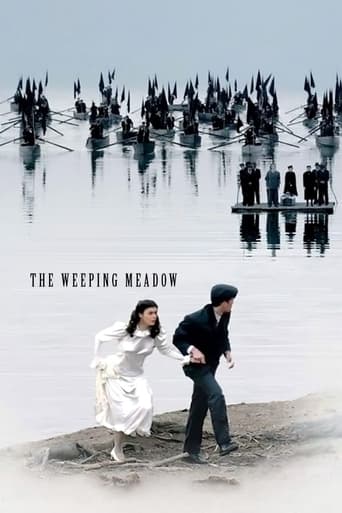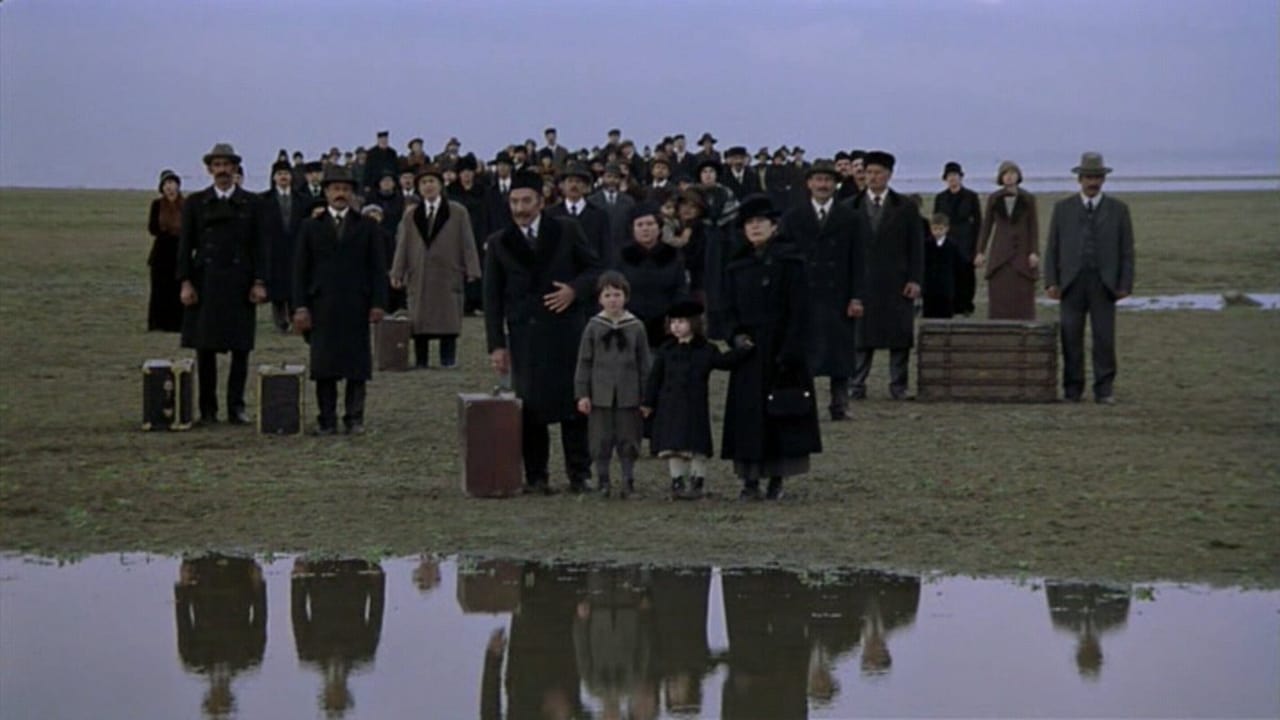Nick Dees
I viewed this movie at the TIFF in 2004. It was the first film I ever seen their and I have been going back every year since, hoping to see something that was as moving. By far one of the greatest films I have ever viewed. The cinematography, the acting, the script all worked hand in hand. At times when the dialogue was silent you were still captivated by what was being shown on the screen.The movie is long, but I did not lose interest once. I was lucky enough to meet Mr. Angelopoulos at the premier of his film and believe me for a movie buff like me it was a great honor even thought I did not realize it at the time. I believe that this film should be on every bodies must watch list if you are looking for a movie that is deep.I have since viewed a lot of movies and have yet to fond anything that I believe is as important.
mastoor masoud
Being simple is the most difficulty action. ( Theo Anjelo Poulous) Weeping meadow is the simplest and intelligible and may be the bitterest , the most tragic, the most perfect and millions of the best adjectives among his work of art because don't see except true in it . Something like a secret or without answer happen . Also simple , not means close but full of freedom and many view in the shape of disbelief . View , not means fresh picture's and extreme long shut but views full of history and feel of heavy truth of person pain . If rely on said,s Angelo , when he want relate mother,s pains of now century and also with make a pause in front of Eleni,s name ( in Greek language it,s mean Greece) , couldn't interpret except mother,s history . ( Greece ) . Eleny,s life history is collection of pains . when she was child , her parents died and be come displaced , unwashed at teenager become mother . at young turn away of marry with old Aspiros and flight by son,s Spyros . Her husband let her ,his work caused it . She put in Jail for many years . Refuge of someone was revolutionary caused it . Her sons fight a war at two fronts and both of them died disbelief. And Finlay her husband,s letterer's read but very late . And she stay with predestination that,s unable Bitter word to explain . Eleni is self history . Anjelo take us to deep of the history with long shut and allow us to set thin king about it , with out any detour . blue color is color,s motherland Greek and faces remind blue and white Greek flag , in where like seaside chairs and explain Eleni,s predestination usual in following surface it . National and old Greeks custom consider in whole of film . Characters performance old theater of Greece like as traditional actors .Where Spyros come to amphitheater and cry Eleni,s name . Homeless persons come out from booths of theater and see old Spyros that take a step slow on sen . He play your tragic role similar to real theater . At this special moment , show next tradition in cinema tradition to pay tribute to theater . In next place and while Spyros funeral ceremony , persons show live roles them selves in front of Angelo,s cine camera similar to actors of real theater and while dancing and special ceremonies of villages of Greek . Alexis and Eleni,s introduction to musician have shape of theater . Each musician come in frame , within a special distance and with musical sound , himself introduce to them .Dance and music is other part of Greece,s culture that relate by Angelo . Spyros see the last dance him self by Eleni with his baby,s song , that able its call death dance . Perhaps in this picture's able think to Oedipus heavy shadow and homicide . Howker musicians and Nikos can be refuge for think to history , music and culture even in train plan where group with empty handed come back to city . Nicoss prostitution stage and her relation with one of soldiers in train show mythical and championship shapes Nikos come out with distressed shape from bathroom and meet Eleni look. She draw hand to her head in mythical from and said ;my hat
isn't my hat? Anjelo Poulous doesn't leave his poverty-stricken character suffering from prostituting his body and sympathetically makes Nikos seek for Identity, value and grave through a symbolic trilby. As if he want say; my Honor
..isn't my Honor;and painful is only and her look to history. In this special face ,that able understand it part of history ,all go to sleep and isn't someone except Eleni. Shes a wake and watchful and seeing this much pain. Able look at the film with two opposite shape,about go village under water. If understand Eleni's flight with Alexis is guilt,their presence and come up water its mean,people of village curse then them the people and Spyros . Spyros indecent behavior with Eleni and Alexis and village assist with Spyros involve in lasting curse at the village is the same big home that stay on it where Eleni and Alexis spend with their twins at night.
Author-Poet Aberjhani
Fate and History are not presented as flesh and blood characters in this first part of Theodoros Angelopoulos' "Trilogy: The Weeping Meadow," but the presence of each is so tangible that they could be exactly that. The central characters, Alexis and Eleni first meet as children driven together by the destruction of the town of Odessa, Greece, during World War I. As they grow up, their lives take one fateful twist after another, beginning when a teen-aged Eleni gives birth to twin boys. Growing into a young woman, she marries a man old enough to be her grandfather but, at the wedding ceremony's conclusion, abandons him to run off with her elderly groom's son, Alexis, who has grown into a gifted musician.Eleni's hope is clearly to reclaim her adopted twins and live a life of domestic harmony and loving devotion but the abandoned groom will have none of that as he hounds their every step until he literally drops dead. History also proves an enemy to their happiness. With the coming and passing of the Second World War, the young lovers go through a series of transformations as social outcasts, struggling artists, desperate parents, and political refugees. This spellbinding odyssey takes its greatest toll on Eleni, who loses her husband, twin sons, and sanity to the ravages of twentieth century warfare. She becomes a kind of "Everywoman" of the first half of the twentieth century, an era when countries worldwide repeatedly called men to war while women became casualties of the grief, poverty, and physical destruction left behind.From its opening scene of Greek refugees from Odessa moving toward a river, to its conclusion, "The Weeping Meadow" floods the screen with some of the most eerily surrealistic images in cinematic history. Were it not for the progression of a precise time-line moving from one World War to another, and providing a solid structure for the overall drama, a viewer might easily get lost drifting along in such haunting images as dead sheep hanging from the branches of a tree, a funeral service conducted in row boats alongside rooftops, or a crowd of wailing women running toward a field of dead "husbands, sons, and brothers." The images take on even greater intensity framed by composer Eleni Karaindrou's brilliant soundtrack.That this first part of Theo Angelopoulos' Trilogy is an indisputable masterpiece is a fact that speaks for itself. The only question is whether the great director will be able to achieve in parts two and three the same sweeping grandeur and majesty that fills every frame of "The Weeping Meadow." by Author-Poet Aberjhani, author of "Encyclopedia of the Harlem Renaissance"
zetes
I think anyone familiar with Angelopoulos knows what to expect with his films: long, drawn out, meticulously planned shots that slowly scan environments, with the image composed of not only the foreground but hundreds of yards into the background. I guess some are not impressed with the director's style, but that really astounds me. I definitely see the man as a master of his medium, and The Weeping Meadow is as good as any of his other films every one I've seen so far is a masterpiece or close to it. This film has a lot in common with the director's first big success, The Traveling Players. It follows a little girl, Eleni, from 1919 to the time of the Greek Civil War, at the end of WWII. And, as the title implies, it's a great tragedy. There is a lot of weeping. It may be long and slow, but it's always gripping. Angelopoulos' imagery is second to none in modern cinema. There are just so many jaw-dropping sequences. My favorite was the one where the camera explored its way through a maze of bed sheets drying on clotheslines, discovering various musicians hidden within. It's not a complaint, per se, but if you're going to watch the film beware of its chronological ellipses. The film can skip ahead years in just a second, when the pace usually makes each second feel like years (in a good way!). I hope New Yorker video, or some other company, digs up the Angelopoulos films that have been unavailable so far, and puts The Traveling Players on DVD, as well.


 AD
AD

